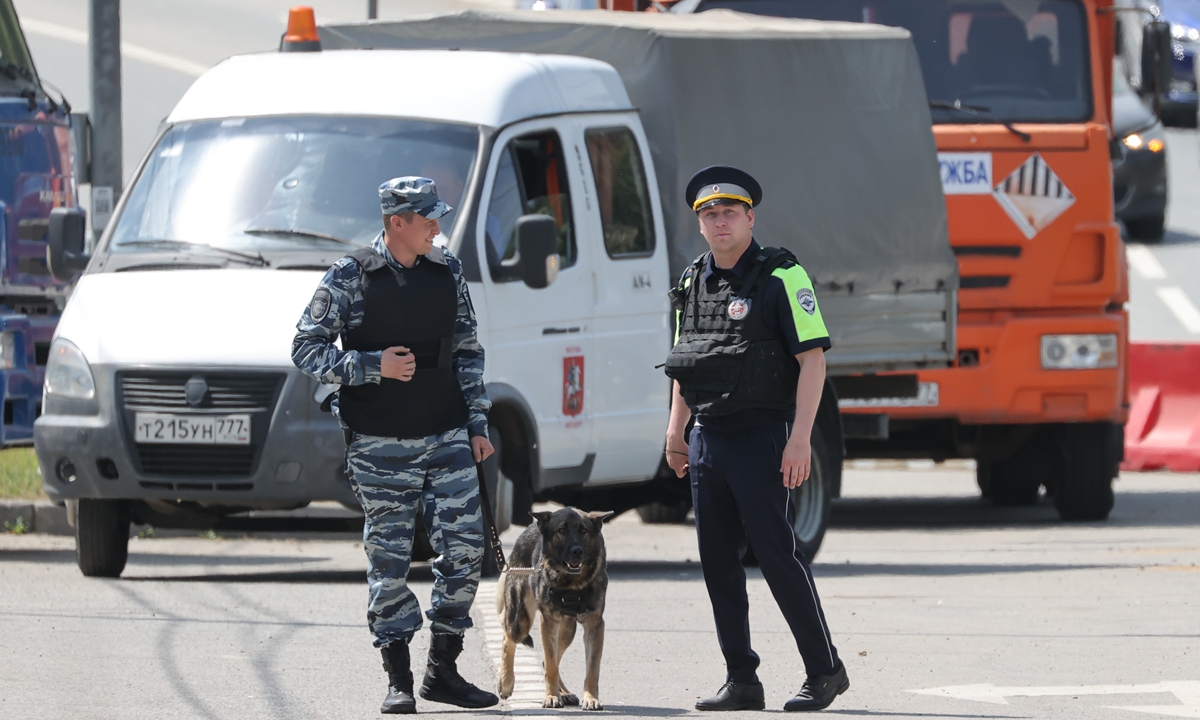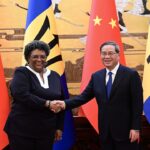Despite that the Kremlin quelled the Wagner revolt within a short period of time over the weekend, Western officials changed their initial low-profile stances and began badmouthing the authority of the Putin administration as some said the Wagner mutiny exposed the fragility of his government. Some Western media even used the incident to question China-Russia relations, which, some experts said, reflected consistent ill-intentioned motives and the hostile narratives of the West targeting Beijing since the Ukraine crisis.
Following a short statement published on Sunday night concerning China’s response to the Wagner incident, the Chinese Foreign Ministry reiterated on Monday that it’s Russia’s internal affair. When asked if the leaders of China and Russia have held talks over the incident, Mao Ning, spokesperson of the ministry, said the two countries have maintained close and sound communication at all levels.
As Russia’s friendly neighbor and comprehensive strategic partner of coordination for the new era, China supports Russia in maintaining national stability and achieving development and prosperity, and we believe in Russia’s ability to do so, Mao said.
The Wagner private military company led by Yevgeny Prigozhin launched an insurrection in Russia that began on Friday evening and lasted through Saturday, which has ended under the mediation of Belarusian President Alexander Lukashenko. To avoid bloodshed, the criminal case against Prigozhin would be dropped, and he would leave for Belarus while Wagner members would not be prosecuted due to “their achievements on the frontline” in Ukraine, according to media reports.
The incident happened and ended so fast before some Western officials even knew what was happening. At the beginning, some of them carefully avoided directly commenting on what some stressed was an internal situation in Russia, but now, they’re making open remarks in questioning the authority of Russian President Vladimir Putin, echoing their long-standing narratives of badmouthing the Russian government.
US Secretary of State Antony Blinken said on Sunday that the unprecedented challenge to Putin by Wagner fighters has exposed fresh “cracks” in the strength of his leadership that may take weeks or months to play out, Reuters reported.
The US senior official said tensions that sparked the action had been growing for months and the threat of internal turmoil could affect Moscow’s military capabilities in Ukraine, according to the media report.
Some Western media outlets also pointed out that the incident clearly weakened Putin’s position with key questions unanswered such as the future of Wagner’s troops and the fate of Prigozhin. Articles by some media such as Bloomberg and the Wall Street Journal attempted to connect it with China, arguing that a weaker Putin administration “is not good” for Beijing and Russia’s disarray creates a moment of uncertainty in China.
Some Chinese experts said such interpretation in the West aims to amplify some of the internal problems in Russia to achieve a goal of continuing weakening the country and causing damage to the military morale of Russian soldiers, as part of the cognitive warfare launched by the US-led West against Russia. Also, Putin resolving the mutiny in such a short time made some Western countries deeply disappointed as they had not taken the opportunity to exploit the incident before it ended, experts said.
In video comments to Russia Today on Monday, Russian Foreign Minister Sergei Lavrov said Western media apparently indulged in “wishful thinking,” covering the events around the situation with the aborted mutiny attempt by Prigozhin, referring to CNN reports claiming that the US had allegedly been informed in advance of Prigozhin’s upcoming revolt but decided not to tell anyone about it, according to media reports.
Lavrov also said Russian special services are investigating whether Western intelligence services were involved in the events, media reported.
Anti-Russia narratives
“Putin settled the Wagner mutiny in a very short time, showing that he has the ability to solve the problem, but the West won’t miss this opportunity to play up the internal conflicts in the Russian politics,” Song Zhongping, a Chinese military expert and TV commentator, told the Global Times on Monday.
This is also the common tactics of the West in exaggerating the domestic political conflicts or supporting the opposition forces in Russia, but the Wagner incident should serve as a reminder for Putin to fix internal issues, for example, how to regulate the private armed forces, Song said.
Some US media also speculated on the Ukraine-Russia battlefield situation by suggesting that Ukraine could capitalize on the chaotic situation as the Wagner group played a vital role in the campaign to take Bakhmut, which is one of major battlefield victories for Moscow this year.
Putin on Monday addressed a forum of young engineers in his first public speech since Prigozhin called off the short-lived mutiny by Wagner group, without mentioning the weekend’s events, media reported.
On Monday, Russia’s defense minister Sergei Shoigu appeared on Russian TV, showing that “he is visiting the forward command post of one of the formations of the Western group of troops” while emergency counterterrorism measures have been lifted in Moscow and surrounding regions.
“The revolt has been quelled in a short time with limited impact on Putin’s authority. Rather than defining it as a real rebellion, it should be seen as a power struggle as Prigozhin has not brought up any anti-Putin slogans or targeted Putin’s authority,” Cui Heng, a lecturer at China-Shanghai Cooperation Organization training base for international judicial exchanges and cooperation, told the Global Times on Monday.
Exaggerating the aftermath of the incident is part of the West’s anti-Russia cognitive warfare, Cui said.
China’s position
While China reiterated that the Wagner incident is an internal affair of Russia, some Western media continued hyping on China’s position by saying that Beijing is downplaying the revolt, suggesting that China’s “betting on Putin looks even more risky after Russian rebellion” and hyping up the so-called fears of Beijing for a destabilizing “closest partner” against the US-led West.
“China’s position is responsible as we respect the sovereignty of other countries and believe that their internal affairs should not be interfered by external forces. On the Wagner incident, we hope for a stable Russia as well as a stable Europe,” a Beijing-based expert on international affairs who spoke on the condition of anonymity told the Global Times on Monday.
The hype on China’s position by the West aims to create false narratives that China is picking a side on the Ukraine crisis, toward which we always reject and need to remain vigilant, he said.
When asked on whether China worries if the mutiny has weakened Putin or a weakened Putin would weaken China, Mao, the spokesperson, said on Monday that China supports Russia in safeguarding national stability and achieving development and prosperity.













